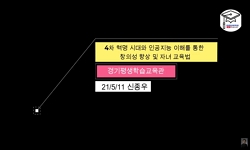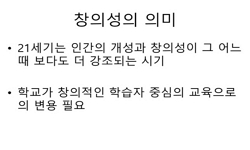Artificial intelligence, robotics, and so forth. The era of the Fourth Industrial Revolution can be a new opportunity for someone and a threat to someone else. This environmental change emphasizes the importance of human resources within an organizati...
http://chineseinput.net/에서 pinyin(병음)방식으로 중국어를 변환할 수 있습니다.
변환된 중국어를 복사하여 사용하시면 됩니다.
- 中文 을 입력하시려면 zhongwen을 입력하시고 space를누르시면됩니다.
- 北京 을 입력하시려면 beijing을 입력하시고 space를 누르시면 됩니다.

지식은폐 행동이 창의성에 미치는 영향 - 성별 조절효과를 중심으로 = The Effects of Knowledge Hiding Behavior on Creativity : Focusing on gender moderating effect
한글로보기https://www.riss.kr/link?id=A106336421
- 저자
- 발행기관
- 학술지명
- 권호사항
-
발행연도
2018
-
작성언어
-
- 주제어
-
KDC
300
-
등재정보
KCI등재
-
자료형태
학술저널
-
수록면
245-281(37쪽)
-
KCI 피인용횟수
1
- DOI식별코드
- 제공처
- 소장기관
-
0
상세조회 -
0
다운로드
부가정보
다국어 초록 (Multilingual Abstract)
Artificial intelligence, robotics, and so forth. The era of the Fourth Industrial Revolution can be a new opportunity for someone and a threat to someone else. This environmental change emphasizes the importance of human resources within an organization. The diverse ideas, knowledge, and know-how of various employees in an organization can only be owned by that organization, and many organizations want their employees to actively share their knowledge and know-how. But unlike that expectation, employees often act to hide their knowledge and know-how intentionally. This action may degrade the organizational performance as well as lower the creativity of the individual doing the hiding. Creativity can also be manifested through diversity. Many organizations try to express creativity through organizational diversity. In this study, we investigated whether the knowledge hiding behaviors differ according to gender, creativity, which is the most important factor in the 4th industrial revolution era, how the knowledge hiding affects creativity, This study examined whether the effect of gender on the creativity is moderating effect. The results of this study are as follows. First, It was found that there was a significant difference between the male and female behaviors of the playing dumb behaviors in the subscale of knowledge hiding behaviors. In other words, women behave more like ‘playing dumb’ than men. Second, it was found that the behaviors and behaviors of the knowledge hiding behaviors were negatively related to creativity. Finally, Gender has a moderating effect in the relationship between the knowledge hiding(evasive hiding/the rationalized hiding behavior) and creativity. But the direction turned out to be different. In other words, the decrease in creativity, a dependent variable resulting from an increase in evasive behavior, has been shown to be greater in males than females, and in rationalized hiding behavior, the reduction in creativity, compared to rationalized hiding behavior. This can be said to be a result of confirming once again that men and women are different, demonstrating the importance of developing women human resources.
참고문헌 (Reference)
1 김정매, "호텔 조직 내에서 성별에 따른 공격적 언행이 비생산적 업무행동에 미치는 영향" 대한경영학회 24 (24): 2439-2457, 2011
2 김기승, "한국기업의 여성인력 활용과 향후 과제" LG경제연구원 2003
3 김미숙, "학년과 성별에 따른 영재와 평재의 수학/과학 창의성과 리더십 차이 및 두 능력의 관계 분석" 한국교육심리학회 19 (19): 799-820, 2005
4 박동호, "팀·개인 창의정체성이 개인 효과성에 미치는 영향에 관한 다수준 분석: 팀·개인 창의성의 매개효과를 중심으로" 대한경영학회 28 (28): 2455-2472, 2015
5 유경훈, "초중고 학생들의 개인창의성과 집단창의성 및" 한국영재교육학회 14 (14): 201-222, 2015
6 손태원, "창의성중심 조직행동연구의 현황과 과제- 개인수준의 창의성을 중심으로 -" 한국지식경영학회 6 (6): 123-147, 2005
7 이문선, "창의성과 혁신행동의 관계와 집단특성의 조절효과" 한국인사관리학회 27 (27): 2003
8 안관영, "집단주의와 성취욕구가 조직시민행동에 미치는 효과 및 성의 조절효과에 관한 연구" 한국경영학회 31 (31): 8-1334, 2002
9 박상언, "직무요구-통제 모형에 의한 사원들의 직무소진(Job Burnout)에 관한 연구: 적극적 성격과 자기효능감 변수의 조절효과를 중심으로" 한국인사관리학회 30 (30): 46-70, 2006
10 김미숙, "지식기반사회의 여성 직업교육훈련 발전방안" 한국직업능력개발원 2001
1 김정매, "호텔 조직 내에서 성별에 따른 공격적 언행이 비생산적 업무행동에 미치는 영향" 대한경영학회 24 (24): 2439-2457, 2011
2 김기승, "한국기업의 여성인력 활용과 향후 과제" LG경제연구원 2003
3 김미숙, "학년과 성별에 따른 영재와 평재의 수학/과학 창의성과 리더십 차이 및 두 능력의 관계 분석" 한국교육심리학회 19 (19): 799-820, 2005
4 박동호, "팀·개인 창의정체성이 개인 효과성에 미치는 영향에 관한 다수준 분석: 팀·개인 창의성의 매개효과를 중심으로" 대한경영학회 28 (28): 2455-2472, 2015
5 유경훈, "초중고 학생들의 개인창의성과 집단창의성 및" 한국영재교육학회 14 (14): 201-222, 2015
6 손태원, "창의성중심 조직행동연구의 현황과 과제- 개인수준의 창의성을 중심으로 -" 한국지식경영학회 6 (6): 123-147, 2005
7 이문선, "창의성과 혁신행동의 관계와 집단특성의 조절효과" 한국인사관리학회 27 (27): 2003
8 안관영, "집단주의와 성취욕구가 조직시민행동에 미치는 효과 및 성의 조절효과에 관한 연구" 한국경영학회 31 (31): 8-1334, 2002
9 박상언, "직무요구-통제 모형에 의한 사원들의 직무소진(Job Burnout)에 관한 연구: 적극적 성격과 자기효능감 변수의 조절효과를 중심으로" 한국인사관리학회 30 (30): 46-70, 2006
10 김미숙, "지식기반사회의 여성 직업교육훈련 발전방안" 한국직업능력개발원 2001
11 황선구, "조직시민행동과 직무소진의 관계에 따른 성별, 재직기간의 조절효과" 한국경영교육학회 29 (29): 46-68, 2014
12 김성국, "조직과 인간행동" 명경사 2001
13 한나영, "심리적 임파워먼트와 조직시민행동의 관계에 대한 성취욕구의 조절효과 검증:부산지역 특급호텔 종사자를 중심으로" 한국인사조직학회 19 (19): 185-226, 2011
14 신덕상, "성차에 근거한 여성인적자원개발에 관한 비판적 검토 : KJ법과 메타분석을 중심으로" 한국여성정책연구원 75 (75): 61-91, 2008
15 이혜림, "긍정심리자본이 개인 창의성에 미치는 영향" 한국인사관리학회 2012
16 권기환, "가치혁신 문화가 개인창의성에 미치는 영향 : 대전 중소벤처기업을 중심으로" 한국벤처창업학회 9 (9): 129-146, 2014
17 Evans, J. M., "Withholding the ace: The individual-and unit-level performance effects of self-reported and perceived knowledge hoarding" 26 (26): 494-510, 2014
18 Peng, H., "Why and when do people hide knowledge?" 17 (17): 398-415, 2013
19 Zhou, J., "When job dissatisfaction leads to creativity:Encouraging the expression of voice" 44 (44): 682-696, 2001
20 Černe, M., "What goes around comes around: Knowledge hiding, perceived motivational climate, and creativity" 57 (57): 172-192, 2014
21 Lewis, K., "Transactive memory systems: Current issues and future research directions" 22 (22): 1254-1265, 2011
22 Woodman, R. W., "Toward a theory of organizational creativity" 18 (18): 293-321, 1993
23 Kanter, R. M., "Three tiers for innovation research" 15 (15): 509-523, 1988
24 Perry-Smith, J. E., "The social side of creativity: A static and dynamic social network perspective" 28 (28): 89-106, 2003
25 Amabile, T. M., "The social psychology of creativity: A componential conceptualization" 45 (45): 357-377, 1983
26 May, D. R., "The psychological conditions of meaningfulness, safety and availability and the engagement of the human spirit at work" 77 (77): 11-37, 2004
27 Gouldner, A. W., "The norm of reciprocity: A preliminary statement" 161-178, 1960
28 Hennessey, B. A., "The conditions of creativity" 22 : 11-38, 1988
29 Nonaka, I., "The Knowledge-Creating Company" Harvard business review 1991
30 Perry-Smith, J. E., "Social yet creative: The role of social relationships in facilitating individual creativity" 49 (49): 85-101, 2006
31 Webster, J., "Research in personnel and human resources management" Emerald Group Publishing Limited 1-37, 2008
32 Connelly, C. E., "Predictors of employees’ perceptions of knowledge sharing cultures" 24 (24): 294-301, 2003
33 Amabile, T. M., "Motivating creativity in organizations: On doing what you love and loving what you do" 40 (40): 39-58, 1997
34 Saxe, L., "Lying: Thoughts of an applied social psychologist" 46 (46): 409-415, 1991
35 Hislop, D., "Linking human resource management and knowledge management via commitment: A review and research agenda" 25 (25): 182-202, 2003
36 Reiter-Palmon, R., "Leadership and creativity: Understanding leadership from a creative problem-solving perspective" 15 (15): 55-77, 2004
37 Ford, D. P., "Knowledge sharing: Seeking to understand intentions and actual sharing" Queen's University. 2005
38 Wang, S., "Knowledge sharing: A review and directions for future research" 20 (20): 115-131, 2010
39 Connelly, C. E., "Knowledge hiding in organizations" 33 (33): 64-88, 2012
40 Govier, T., "Is it a jungle out there? Trust, distrust and the construction of social reality" 33 (33): 237-252, 1994
41 Connelly, C. E., "How perpetrators and targets construe knowledge hiding in organizations" 24 (24): 479-489, 2015
42 Baer, J., "Gender differences in creativity" 42 (42): 75-105, 2008
43 Blau, P. M., "Exchange and power in social life" Transaction Publishers 1964
44 Bartol, K. M., "Encouraging knowledge sharing: The role of organizational reward systems" 9 (9): 64-76, 2002
45 Janssen, O., "Employees' goal orientations, the quality of leader-member exchange, and the outcomes of job performance and job satisfaction" 47 (47): 368-384, 2004
46 Oldham, G. R., "Employee creativity: Personal and contextual factors at work" 39 (39): 607-634, 1996
47 Ford, D. P., "Disengagement from knowledge sharing: the alternative explanation for why people are not sharing" 29 (29): 2008
48 Amabile, T. M., "Creativity in context: Update to the social psychology of creativity" Westview press 1996
49 Peng, H., "Counterproductive work behavior among Chinese knowledge workers" 20 (20): 119-138, 2012
50 Amabile, T. M., "Assessing the work environment for creativity" 39 (39): 1154-1184, 1996
51 김상윤, "4차 산업혁명의 핵심 동력" (10) : 1-13, 2016
52 이민화, "4차 산업혁명으로 가는 길" 창조경제연구회 2016
동일학술지(권/호) 다른 논문
-
부산지역 반(反)성폭력 상담활동가의 성장경험 연구 - 여성주의 정체성 발달을 중심으로
- 부산대학교 여성연구소
- 지영경 ( Ji Young-kyung )
- 2018
- KCI등재
-
신체화 증상, 지각된 건강과 중년 여성의 안녕감과 우울과의 관계에서 미래 시간 조망의 매개 효과
- 부산대학교 여성연구소
- 정영숙 ( Chong Young-sook )
- 2018
- KCI등재
-
남성들의 돌봄 참여 실태와 남성성의 변화 양상 - 대구지역 기혼남성들의 가사·육아를 중심으로
- 부산대학교 여성연구소
- 성지혜 ( Sung Ji-hye )
- 2018
- KCI등재
-
- 부산대학교 여성연구소
- 이춘양 ( Li Chun-yang )
- 2018
- KCI등재
분석정보
인용정보 인용지수 설명보기
학술지 이력
| 연월일 | 이력구분 | 이력상세 | 등재구분 |
|---|---|---|---|
| 2026 | 평가예정 | 재인증평가 신청대상 (재인증) | |
| 2020-01-01 | 평가 | 등재학술지 유지 (재인증) |  |
| 2017-01-01 | 평가 | 등재학술지 선정 (계속평가) |  |
| 2016-01-01 | 평가 | 등재후보학술지 유지 (계속평가) |  |
| 2015-01-01 | 평가 | 등재후보학술지 유지 (계속평가) |  |
| 2013-01-01 | 평가 | 등재후보학술지 유지 (기타) |  |
| 2012-01-01 | 평가 | 등재후보 1차 FAIL (등재후보1차) |  |
| 2010-01-01 | 평가 | 등재후보학술지 선정 (신규평가) |  |
학술지 인용정보
| 기준연도 | WOS-KCI 통합IF(2년) | KCIF(2년) | KCIF(3년) |
|---|---|---|---|
| 2016 | 1.17 | 1.17 | 1.17 |
| KCIF(4년) | KCIF(5년) | 중심성지수(3년) | 즉시성지수 |
| 1.22 | 1.23 | 1.536 | 0 |




 RISS
RISS KISS
KISS







